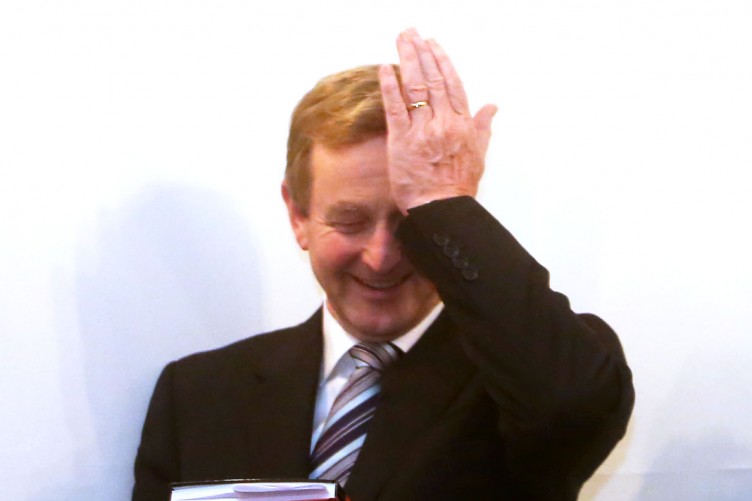It shows very little self-confidence for Fianna Fáil to refuse, on moral principle, to enter a partnership government in which they would be treated as equals with Fine Gael. But it does display a “cute hoor” mind-set that suggests that FF expects any new government to have to take hard decisions to govern properly for which FF would prefer to take little or no responsibility.
FF’s crass ultimatum to the Independents last weekend was not clever politics. Nor was their rumoured refusal to contemplate reducing any arrangement with FG to writing. After all as the adage says: “A verbal agreement ain’t worth the paper it’s written on.”
FG, for their part, has also looked weak and indecisive. 50 days without substantive engagement with FF was inexcusable. It is also bewildering for the electorate. Causing or allowing their parliamentary party to pass resolutions about Irish Water was silly. If they want to make that into a “red-line” issue, they should ask themselves just how that would, or will, go down with the voters.
Equally inexplicable is the message coming from FF that they will not facilitate any minority government that includes Labour. Since they themselves were courting the support of Labour over the last 50 days, it beggars belief that they could object to facilitating a government in which Labour partook – not that Labour would be as foolish as to enter such a government in present circumstances, whatever Joan Burton may think.
The real explanation for insisting on the exclusion of Labour is that FF wants to be seen as facilitating a “change of government”.
But FF’s appetite for change only goes so far; they badly want Enda Kenny to remain as Taoiseach because they sense that Enda weakens FG’s appeal in any snap election scenario.
Within FG, the party’s rules prevent any quick change of leader. But the rules do not prevent the party from proposing a TD other than Enda as Taoiseach. That is what happened in 1948 when FG was led by Richard Mulcahy – but proposed John A Costello to become Taoiseach.
The FG front-benchers must now ask themselves whether they are willing to be forced into office led by Enda Kenny in circumstances where they can then be plunged into a general election by FF without having had any opportunity to review or renew their leadership. If they are happy to take that course, so be it.
But if they have any capacity to look around corners left, FG frontbenchers should meet without the presence of Enda, and work out whether they want FG to be exposed to that risk, and to consider whether the John A Costello precedent would be better for the party.
The chances of such a meeting are slim – chiefly because any enthusiasm for such a meeting might cost existing ministers their jobs on grounds of disloyalty and because the likely candidates to replace Enda are unlikely to come to any agreement on the identity of an alternative FG nominee for Taoiseach.
All of that plays into Enda’s understandable personal ambition to be the first FG leader to be re-appointed as outgoing head of government since WT Cosgrave in 1927.
People, like me, who don’t want Sinn Féin in government are in no credible position to attack them for not seeking office. The Independents have been reasonable in the last few weeks in insisting that they know the basis of FF/FG cooperation. Our problem does not lie with them.
Thus, we collectively stumble into a weak government at a time when we badly need a strong government.
The ESB pay deal and the Luas dispute are the visible tips of an industrial relations ice-berg towards which any new government is floating. Two-tier pay in the Gardaí, the nursing sector, the public sector generally and, even, the judiciary, is politically indefensible in the context of the recovery such as it is. It will have to be dismantled There will be pressure to reverse the revised pension entitlements for new public service entrants as well.
There is, then, every sign of a major wave of pent-up pressure to increase significantly the size of the public sector wage bill.
Coupled with the constantly mismanaged health service budget, pay claims pressure means that the so-called “fiscal space”, whose dimensions seemed immense when it suited electoral requirements, has not merely contracted – it has disappeared into a newly discovered “black hole” in the political universe.
Will a minority government be pushed into a new Social Partnership? Will we see the non-government majority of TDs back a strong line in pay disputes with, say, the nurses? The infamous phrase of the late James Gogarty of Tribunal memory springs to mind: “Will we…?”
The likelihood of Brexit is increasing. We, in Ireland, should especially remember from recent experience that pre-referendum polls do not reflect intensity of conviction. Are the UK leavers more determined than the UK stayers? Which group is more likely to turn up at the polling stations? The angry or the content? The old or the young?
Remember, if there is a snap election – whether in the next few weeks or in the next 18 months – as I hinted here last week, there is every likelihood of a pop-up centre/centre-right reformist political party emerging to seek a seat in every constituency (i.e. 40 seats) on the express policy platform that they will form a government in the national interest with any ideologically compatible party or parties.
That development might spell big trouble for the existing political order – including FG, FF and the independents.
The old Civil-War parties’ calculus that they could – on a rotating basis- permanently and simultaneously dominate both government and opposition benches has been ended by the reduction of their joint traditional electoral support from more than two-thirds to less than half.
Fianna Fáil may think that the good old days may return; I have my doubts that strategy will succeed.

